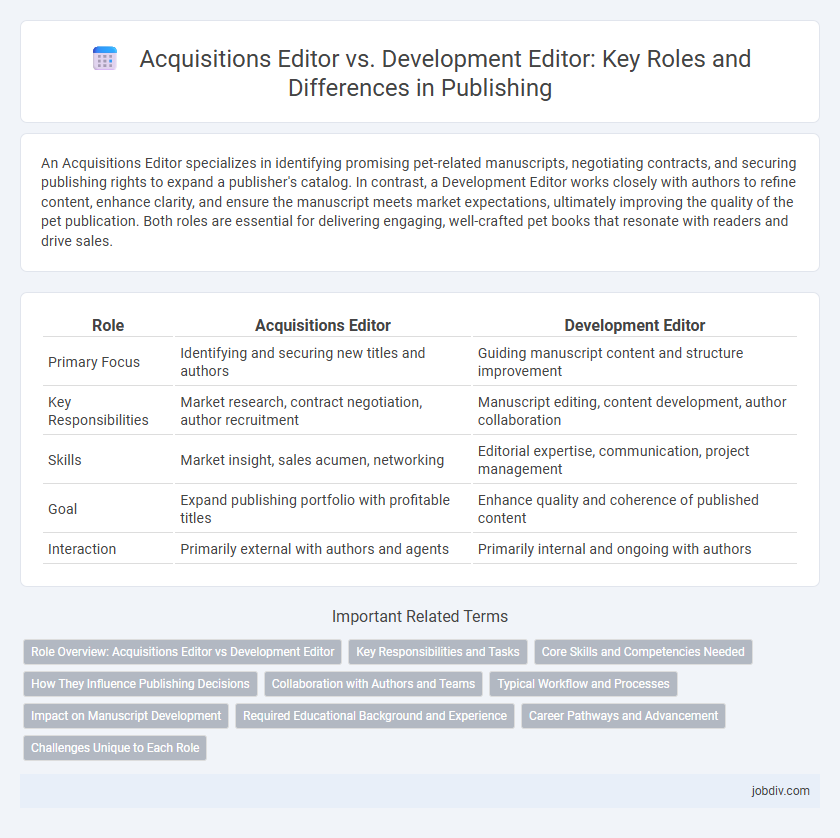An Acquisitions Editor specializes in identifying promising pet-related manuscripts, negotiating contracts, and securing publishing rights to expand a publisher's catalog. In contrast, a Development Editor works closely with authors to refine content, enhance clarity, and ensure the manuscript meets market expectations, ultimately improving the quality of the pet publication. Both roles are essential for delivering engaging, well-crafted pet books that resonate with readers and drive sales.
Table of Comparison
| Role | Acquisitions Editor | Development Editor |
|---|---|---|
| Primary Focus | Identifying and securing new titles and authors | Guiding manuscript content and structure improvement |
| Key Responsibilities | Market research, contract negotiation, author recruitment | Manuscript editing, content development, author collaboration |
| Skills | Market insight, sales acumen, networking | Editorial expertise, communication, project management |
| Goal | Expand publishing portfolio with profitable titles | Enhance quality and coherence of published content |
| Interaction | Primarily external with authors and agents | Primarily internal and ongoing with authors |
Role Overview: Acquisitions Editor vs Development Editor
Acquisitions editors focus on identifying, evaluating, and securing rights for new book projects that align with the publisher's market strategy. Development editors work closely with authors to shape and refine manuscripts, enhancing content quality, structure, and market appeal before publication. Both roles are critical in the publishing process, with acquisitions editors driving project selection and development editors ensuring editorial excellence.
Key Responsibilities and Tasks
An Acquisitions Editor identifies and acquires promising manuscripts and authors to expand the publisher's catalog, focusing on market trends and contract negotiations. A Development Editor works closely with authors to refine content, structure, and style, ensuring the manuscript meets quality standards and audience expectations. Both roles require strong communication skills, but Acquisitions Editors emphasize strategic growth while Development Editors prioritize content enhancement.
Core Skills and Competencies Needed
Acquisitions Editors excel in market analysis, contract negotiation, and author relationship management, requiring strong communication and decision-making skills to identify and secure promising manuscripts. Development Editors focus on manuscript evaluation, structural editing, and content refinement, demanding expertise in narrative development, attention to detail, and collaborative problem-solving. Both roles necessitate deep knowledge of publishing workflows, editorial standards, and audience engagement strategies to ensure successful book production.
How They Influence Publishing Decisions
Acquisitions editors play a crucial role in publishing decisions by identifying market trends, scouting promising authors, and selecting manuscripts with high commercial potential, directly influencing the publishing house's catalog and profitability. Development editors shape the content quality by working closely with authors to refine narrative structure, character development, and thematic elements, ensuring the final product meets both editorial standards and audience expectations. Together, these editors balance market viability with creative excellence, guiding projects from acquisition through to publication success.
Collaboration with Authors and Teams
Acquisitions editors collaborate closely with authors to identify promising manuscripts, negotiate contracts, and shape initial proposals, ensuring alignment with market trends and publishing goals. Development editors work extensively with authors post-acquisition to refine content, enhance narrative flow, and improve overall manuscript quality through detailed feedback and multiple revisions. Both roles require seamless communication with marketing, design, and production teams to synchronize efforts and optimize the publishing process from manuscript inception to final publication.
Typical Workflow and Processes
Acquisitions editors primarily focus on identifying and securing new book projects by reviewing proposals, negotiating contracts, and collaborating with authors to shape initial concepts. Development editors work closely with authors post-acquisition to refine manuscripts through detailed feedback, structural edits, and content enhancement to ensure alignment with market expectations. Both roles coordinate with marketing, production, and sales teams to streamline the publication timeline and optimize the book's success.
Impact on Manuscript Development
Acquisitions editors influence manuscript development by selecting works with strong market potential and aligning them with publishing goals, shaping initial content direction. Development editors engage deeply with authors to refine structure, enhance clarity, and improve narrative flow, directly impacting the quality and coherence of the final manuscript. Their collaborative efforts ensure that both market viability and artistic integrity are balanced throughout the publishing process.
Required Educational Background and Experience
Acquisitions editors typically require a bachelor's degree in English, communications, or publishing, combined with several years of experience in sales, marketing, or editorial roles to assess market trends and negotiate book deals effectively. Development editors usually hold a degree in English, literature, or a related field, along with extensive editorial experience focused on manuscript evaluation, content structure, and author collaboration. Both roles benefit from strong communication skills and an in-depth understanding of the publishing industry, but acquisitions editors emphasize market analysis while development editors prioritize content refinement.
Career Pathways and Advancement
Acquisitions editors primarily focus on identifying and securing new manuscripts, honing negotiation skills and industry contacts, which often leads to senior editorial or publishing executive roles. Development editors concentrate on refining and enhancing content through collaboration with authors, building expertise in project management and editorial strategy that can advance to managing editorial teams or specialized publishing departments. Career progression in both roles requires strong communication, market insight, and adaptability to shifting industry trends.
Challenges Unique to Each Role
Acquisitions Editors face the challenge of identifying marketable manuscripts that align with the publisher's strategic goals while negotiating contracts and managing author relationships. Development Editors must address the task of refining content to enhance narrative clarity, coherence, and appeal, often balancing author vision with market demands. Both roles require navigating tight deadlines and evolving industry trends, but Acquisitions Editors emphasize selecting viable projects, whereas Development Editors concentrate on improving the quality of acquired works.
Acquisitions Editor vs Development Editor Infographic

 jobdiv.com
jobdiv.com